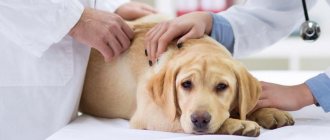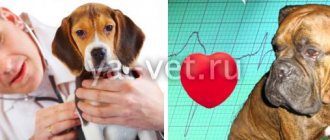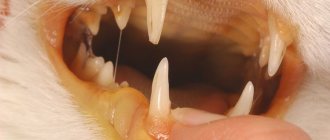Why does a dog become lethargic - possible reasons
The fact that a dog has weakness can be understood by its behavior - it may not respond to its name, may not show any reaction to external stimuli, it sleeps most of the time and even refuses its favorite treats.
Physiological factors affecting a dog's appetite
When a dog is constantly sleeping and lethargic, this sign may indicate the development of various diseases and pathological processes.
Attention! If the animal begins to avoid meals and becomes drowsy, it should be checked for other symptoms - fever, diarrhea or constipation, nausea.
The absence of accompanying symptoms is a positive sign and indicates that lethargy is caused by physiological reasons.
Some animals have a capricious disposition, which is why they may periodically show obstinacy in relation to their diet
Overwork
Excessive and prolonged physical activity, spending too much time on the street - all leads to overwork, from which the animal may be lethargic for some period and sleep a lot. If signs appear after a long walk, the pet just needs to rest.
Dehydration
Dehydration occurs in extreme heat, if the animal does not receive enough water, or due to poisoning in which there was vomiting or prolonged diarrhea. Main signs of dehydration:
- weakly palpable pulse;
- slow heart rate;
- viscous saliva.
The rate of water consumption per 1 kg of pet weight is from 50 to 100 ml.
Sun or heatstroke
Prolonged sleep and lethargy during wakefulness may indicate heatstroke or sunstroke if the animal spent a long time outdoors in extreme heat. Symptoms:
- dry nose (normally it should be a little wet to regulate heat exchange);
- increased body temperature;
- drowsiness;
- nausea, vomiting;
- loose stool.
Attention! Overheating can be fatal. Small and decorative breeds - Yorkies and Spitz - are especially susceptible to heat stroke.
In hot weather, it is necessary to take preventive measures to prevent sun and heat stroke
Insect bites
When a dog lies lethargic, especially after a walk in open areas, forests, parks, and other places with tall grass, a tick bite may have occurred. These parasites cause the most dangerous disease piroplasmosis. Symptoms:
- elevated temperature;
- dark color of urine;
- rapid breathing;
- vomiting and diarrhea.
These signs appear within 2-3 days, after which the pet’s condition worsens sharply. If you suspect the presence of an insect, you must carefully examine the dog's entire body, especially the ears and paws. The detected parasite must be removed from the skin as quickly as possible, the wound must be treated with antiseptic, and a veterinarian should be contacted for further treatment.
Overeating or poisoning
The causes of lethargy in a dog may be due to excessive eating of food. If the number of calories consumed exceeds their expenditure per day, the pet will become lazy and would prefer to just lie down for activity.
Poisoning, which causes intoxication and, as a result, severe weakness, can be caused by the following factors:
- poor quality of products;
- taking medications;
- contact with household chemicals;
- entry of poisons into the body.
Additional Information! Poisoning is indicated by vomiting and diarrhea for 2 days and a complete lack of appetite.
After vaccination
A lethargic puppy may be observed after vaccination. Although vaccinations are well tolerated by pets, there is always a small chance of side effects.
Usually the side symptoms are not serious and last no more than 3 days. But if the animal’s lethargy persists longer, it is necessary to contact a veterinarian.
After vaccination, your pet must be monitored
Diseases that cause a dog to lose its appetite
The reasons for a sad and inactive dog may be associated with the development of a number of diseases in the pet:
- Diseases of the digestive system - gastritis, enteritis, intestinal obstruction. Due to bloating and indigestion, the animal's stomach hurts, which is why it ignores food.
- Diseases of the musculoskeletal system, muscle pathologies - with them, pain may be observed with any movement, including when eating food.
- Oncology - rapid weight loss adds to the lack of appetite and drowsiness.
- Infectious diseases, particularly dangerous are distemper and rabies. If your pet's limbs suddenly begin to give way, in addition to a bunch of other symptoms, contacting a veterinarian should be urgent.
- Infection with intestinal parasites.
- Pathologies in the oral cavity, dental problems, when chewing food brings severe discomfort and pain.
Additional Information! If the fur becomes dull, the color of urine and feces has changed, this indicates serious pathologies of the internal organs.
Treatment
If your suspicions are increasingly confirmed, you should begin therapy immediately.
Of course, special remedies have already been developed, for example, Prozac, which are given to pets for nervous disorders, but you should not resort to them right away. If the disease has not taken a clinical form, gentler methods will help restore the dog to its former health.
It is not always within the owner’s power to help a beloved pet on their own, because there are both acute and chronic forms of the disease, so it is necessary to be careful and take the necessary measures in a timely manner.
Treatment includes the following methods:
- First of all, you should go to the clinic to determine the cause of the pathological condition. It is quite possible that the dog is suffering from pain accompanying serious diseases of the internal organs or physical injury;
- The dog must be protected from any shocks. If previously noisy companies constantly gathered in your house, now you should give it up;
- give your pet as much attention as possible so that he does not feel abandoned;
- you can add something new to your dog’s toy collection that will occupy his attention and lift his spirits;
- walking the dog more often, perhaps the lack of fresh air and daylight became the reason for the development of his illness. You can take her to a quiet park or forest, which will have a positive effect on her health;
- if the cause of the upset lies in the loss of a friend, you should think about purchasing a puppy. You can also invite other dog lovers for a walk, introduce your ward to other dogs;
- Do not shout at the animal or punish it, this may make the situation worse. It is quite normal in this condition that the dog behaves strangely, gets underfoot or walks past the toilet;
- in difficult cases, you can give soothing infusions of herbs, this will protect the body from the effects of stronger drugs and will allow your pet to recover much faster.
It is believed that listening to calm classical music or the dog’s favorite composition (if available) has a positive effect on his well-being.
If the disorder has turned into a clinical form, the dog is still not interested in games, walks, the owner’s excessive care is indifferent to him - it’s time to add medication. Such treatment can last from a month to a year, but, fortunately, there is no risk of addiction, since the duration of the course is determined by the person.
When refusal of food and water is the norm for a pet
Lack of appetite does not always indicate pathological processes. There are situations where lethargy and drowsiness in an animal is the norm:
- hot weather (during the cold season, appetite usually increases);
- change of diet;
- estrus;
- problems with chewing function in older dogs (with gradual wear of the enamel on the rear incisors) or in puppies when the dentition is being replaced;
- excess of mineral elements and vitamins;
- stress;
- pregnancy, postpartum period.
If, in addition to refusing to eat and drink, the dog has no other accompanying symptoms, he needs to be observed for some period, perhaps this behavior is the norm for some period.
After surgery, lack of appetite is also normal.
Depression in dogs
Just like people, dogs can suffer from mental health problems such as depression. Depression in dogs is usually caused by major changes in their environment and behavior, such as the loss of their owner or another pet, a child or partner, moving, moving into their home, or indeed, you and your dog moving to a new home. Chronic boredom can also lead to depression in dogs, as well as dermatological problems such as paw licking syndrome.
Signs of depression in dogs may include a less playful mood, less interaction with other dogs, lack of appetite, a less sociable personality, and chewing or licking of paws. Fortunately, as long as they are given plenty of love, care and attention, most dogs will survive depression within a week or two.
^Top
Methods for normalizing appetite
In cases where the lack of appetite and drowsiness are not caused by pathologies, the pet’s appetite can be normalized by the following measures:
- skipping several meals to make the animal hungry;
- increased strength of physical activity, large breeds, German shepherds, Labradors, need to move more than decorative animals;
- providing long and frequent walks;
- introduction of new products into the diet.
Additional Information! A secret that will help awaken the appetite is to feed your pet a piece of lightly salted fish 10-15 minutes before feeding. This is an effective method to stimulate hunger.
Causes of the disease
The main reasons can be called:
- pain;
- departure of a family member of the owner;
- death of a master or friend;
- birth of a child;
- the arrival of a new pet in the house;
- changing of the living place;
- feeling of restriction of freedom;
- change of owner;
- seasonal mood changes;
- old age.
If a dog was adopted from a shelter or from the street, you should not expect gratitude and joy in his eyes. Often such changes affect the pet in unexpected ways. Often, even if the dog was taken from unworthy owners into decent conditions, the animal reacts in an unpredictable way. No matter how strange it may sound, a change of place of residence is very sensitive to the pet.
The cause of depression may be the departure of one of the owners or his death. The dog feels this acutely. If there is grief in the house and the dog’s owners show negative emotions and suffer, this may well be transmitted to the dog.
If an animal lives in an apartment and is rarely walked, it may become sad.
And when a new family member appears in the house, the dog feels left out. She is jealous and as a result feels unwanted and lonely.
What to do if your pet becomes lethargic
If your puppy sleeps a lot and is lethargic, but there are no other signs, you can try to normalize his appetite. The second thing to do is to check the animal for parasites and if they are identified, it is necessary to use anthelmintic tablets.
What is prohibited to do
When a pet has lost its appetite and sleeps most of the day, it is strictly forbidden to disturb it while trying to play. It is prohibited to force feed an animal. You cannot wait long without taking any action. Those diseases that can be cured immediately can lead to the death of your pet within a month.
You cannot force your pet to walk
Symptoms, diagnosis and prognosis
The development of coma is always accompanied by previous symptoms. The state of prelethargy can be confused with other pathologies. The animal becomes sleepy, lethargic, apathetic. Inexperienced owners confuse a comatose state with regular long sleep. At the same time, body temperature is several degrees below normal. The dog stops responding to any sounds, even very loud ones.
If you carefully lift the eyelid and examine the area of the pupil, you will notice that it does not contract when exposed to a light stimulus. Externally, the animal looks like it is already dead. It is not difficult to distinguish coma from death - in pathology there are no signs of rigor mortis.
The animal cannot come out of a coma on its own, although several cases of independent recovery have been described. This is very rare, therefore, if characteristic precomatose signs appear and the onset of coma itself is a reason to urgently contact a veterinary clinic. Any delay in time will cost the animal its life. Depending on its own resources, the dog’s body can remain in a comatose state for up to two weeks, and then death occurs.
When to contact a veterinarian
If your pet has other signs besides drowsiness - vomiting, diarrhea, fever, the animal may tremble, and these symptoms persist for more than 2 days, you should immediately contact a veterinarian.
Lethargy in a pet and ignoring its favorite food is a reason to be wary. You should contact a veterinarian if the animal has a number of other signs indicating the presence of pathological processes, or if lethargy does not go away within several days.
What do veterinarians offer?
When no visible reasons have been found for why the animal refuses food, specialists conduct the following examinations:
- general blood and urine analysis;
- blood test for hormone levels;
- Carrying out radiography to detect or exclude tumors;
- additional examination using ultrasound to detect those disorders that cannot be detected using x-rays;
- tests for detection of worm eggs.
After diagnosis, symptomatic treatment is carried out. As a rule, dogs' appetite is restored as they recover.











